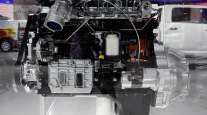Federal Appeals Court Denies ATA’s Petition, Rules Calif. Can Enforce TRU Retrofit Rule
This story appears in the April 12 print edition of Transport Topics.
California environmental regulators can continue enforcing the state’s transportation refrigeration unit retrofit rule, a federal appeals court has ruled.
The U.S. Court of Appeals for the District of Columbia Circuit denied a petition for review, filed last year by American Trucking Associations, that stated the new emissions-reduction rule for any TRU crossing state lines unfairly imposes air quality standards on out-of-state motor carriers.
“The California rule does not require any other state to adopt California’s approach, and it does not apply anywhere but in California, and only to vehicles that have entered California,” the three-judge appeals court panel said.
ATA claimed that California’s rule, which took effect on Jan. 1, is a “de facto national rule” because many trucks pass through California and will be subject to the rule.
The judges called ATA’s argument “weak.”
Robert Digges Jr., ATA vice president and chief counsel, said he was “disappointed” with the ruling.
Digges said ATA has not yet decided whether to request an “en banc” hearing with all nine judges of the appeals court. Court rules require that such a request be filed within 45 days.
“That would seem to be a logical next step,” Digges said.
In an August 2009 brief, ATA argued that the U.S. Environmental Protection Agency should not have granted the state a federal Clear Air Act waiver, a necessary step before regulators could impose standards that are more stringent than federal emissions requirements (8-17, p. 2).
The California Air Resources Board had planned to implement the reefer rule in late 2004, but it was postponed until this year because EPA did not grant the waiver until January 2009.
The rule was devised as part of a plan to reduce diesel particulate matter emissions in California by 75% by 2010 and 85% by 2020.
“In the realm of air quality regulation related to in-use and non-road engines, Congress consciously chose to permit California to blaze its own trail with a minimum of federal oversight,” the appeals court said in its April 2 ruling. “We have no legal basis in this case to disrupt that congressional scheme, overturn EPA’s decision, or otherwise disturb the California rule.”
Stephen Williams, a senior circuit judge and one of the three appellate judges on the deciding panel, issued a brief dissenting opinion.
Williams agreed with ATA that the TRU rule “would effectively vitiate other states’ prerogative to choose whether to embrace” the regulation themselves.
The judge suggested the regulation should be sent back to EPA to determine whether, in its view, rules that create de facto national standards are consistent with the Clean Air Act.
“We argued that motor carriers do not know exactly which trailers are going into a state,” ATA’s Digges said. “They don’t track trailers like they track tractors.
“If you’re a large carrier, you know some of your trailers are going into California, but you don’t know which ones. So it could be a circumstance in which you’re going to have to retrofit or make them compliant with the California law, even though those trailers themselves may never be used in California,” Digges added.
Despite “rumors” that the rule was on hold, state officials earlier this year said that enforcement was under way and that carriers were being fined up to $1,000 for each violation.
In January and February 2010, CARB inspectors conducted more than 2,800 TRU inspections and issued 55 citations for failure to register reefer units and 157 citations for not meeting TRU emissions requirements. In all, violators were assessed fines totaling more than $180,000, CARB said.
CARB also has said that staff members are currently making suggested revisions to the TRU regulation, including possible suggested delays in some categories.




